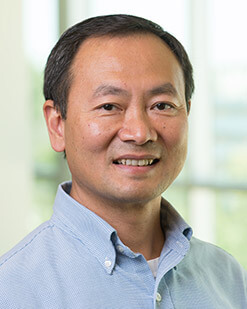Hua Huang, MD, PhD

Hua Huang, MD, PhD is a researcher at National Jewish Health. Dr. Huang is in the Department of Immunology and Genomic Medicine.
Special Interests
Research Interests
My lab studies transcriptional and epigenetic regulation of genes that control immune effector cell development and regulate cytokine and chemokine gene expression. We investigate how super-enhancers and their associated transcription factors integrate signals triggered by various external stimuli, such as antigenic stimulation, infection, cytokine and metabolic products, to generate gene transcription outputs. We also determine the contribution of genetic variants to enhancer activity, gene expression and disease severity. We utilize various cutting-edge technologies, including next-generation sequencing, bioinformatics, enhancer library and CRISPR to address significant research problems in inflammation and allergic immune responses.
Education
Education
- 1995 - 1999
- Leukemia Society Fellow and Postdoctoral fellow, The Laboratory of Immunology, NIAID, NIH, Immunology
- 1993 - 1995
- Leukemia Society Fellow, The Department of Molecular Biology, Princeton University, Stem Cell Biology
- 1984
- Sun Yat-Sen University School of Medicine, Guangzhou, P. R. China, MD
- 1991
- University of Wisconsin-Madison, MS, Immunology
- 1993
- University of Wisconsin-Madison, PhD, Developmental Biology
Awards & Recognition
Visiting Scholarship awarded by the Radiation Effects Research Foundation (Japan)
NIH K22 Research Career Award
Leukemia Society of America Fellowship
The Lydia Schweppe Immunology Career Development Award
Professional Memberships
American Association of Immunology
Publications
Gao JF, Li YL, Guan XY, Mohammed Z, Gomez G, Hui Y, Zhao DZ, Oskeritzian CA, Huang H. IL-33 priming and antigenic stimulation synergistically promote the transcription of proinflammatory cytokine and chemokine genes in human skin mast cells. BMC Genomics. 2023, 592: 10.1186/s12864-023-09702-w.
Li YL, Gao JF, Zhao DZ, Guan XY, Morris SC, Finkelman FD, Huang H. The GC box at the proximal enhancer of the Hdc gene is critical for Hdc gene transcription and histamine-mediated anaphylaxis. J Allergy Clin Immunol, 2023, 152:159. DOI:10.1016/j.jaci.2023.01.031.
Li, Y., Gao, J. F., Kamran, M. Harmacek, L., Danhorn, T., Leach, S. M., O'Connor, B. P., Hagman, J. R., Huang H. GATA2 regulates mast cell identity and responsiveness to antigenic stimulation by promoting chromatin remodeling at super-enhancers. Nat Commun 12, 494 (2021). https://doi.org/10.1038/s41467-020-20766-0
Li Y, Qi X, Liu B, and Huang H. The STAT5-GATA2 Pathway Is Critical in Basophil and Mast Cell Differentiation and Maintenance. J Immunol. 2015, 194: 4328-38. (Also see Editorial in “In This Issue”)
Qi X, L. Chaves, Y.H. Zhuang, Y. Chen, D. Wang, J. Chahon, B. Graham, K. Ohmori, and Huang H. Antagonistic regulation by transcription factors C/EBPa and MITF specifies basophil and mast cell fates. Immunity, 2013, 39, 97-110.
A complete list of my publications can be found on ORCID https://ORCID.org/0000-0001-7317-8983
Academic Affiliations
Professor, Department of Immunology & Microbiology, University of Colorado School of Medicine
Teaching & Professional Positions
Faculty member in the Medical Scientist Training Program and Regenerative Medicine and Stem Cell Biology Program, CU School of Medicine
